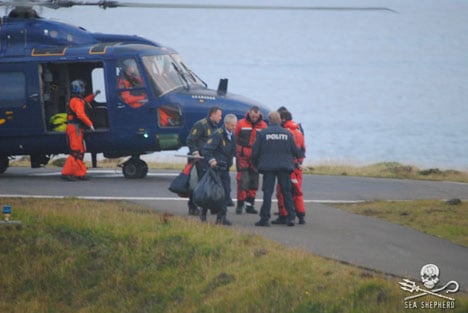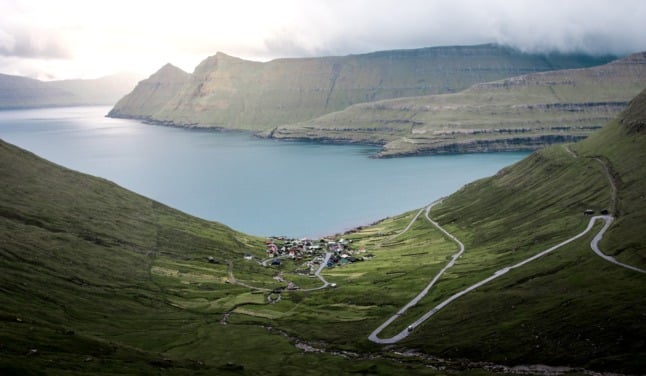FISHING
14 detained trying to stop Faroese dolphin hunt
Animal activists were stopped from their attempts to save a pod of pilot whales, while American actor Charlie Sheen says "Denmark is complicit in the killing".
Published: 31 August 2014 16:22 CEST

In a photo distributed by Sea Shepherd, activists are shown being arrested by Faroese police. Photo: Sea Shepherd
Fourteen activists from the radical animal rights group Sea Shepherd have been arrested in Denmark's Faroe Islands while trying to halt a traditional dolphin hunt, their organisation said Sunday.
The activists were detained Saturday when attempting to save a pod of 33 pilot whales, members of the dolphin family, as the mammals were driven to shore to be killed by waiting hunting parties, according to environmental group Sea Shepherd.
"The 14 have been under arrest since Saturday, and three of our boats have also been seized," Lamya Essemlali, president of Sea Shepherd France, told AFP.
Large numbers of pilot whales are slaughtered each year on the Faroe Islands, an autonomous territory within the kingdom of Denmark.
The method involves the mammals being forced into a bay by flotillas of small boats before being hacked to death with hooks and knives.
While many locals defend the hunt as a cultural right, animal rights campaigners have denounced it as a "brutal and archaic mass slaughter".
The group detained on Saturday included six Sea Shepherd members on shore on Sandoy, and eight who were on three small boats near the island. Sea Shepherd said a ship from the Danish Navy ordered the environmental organisation's three boats to stand off and later seized the vessels.
A spokesman for the Danish Armed Forces' Arctic Command, which is responsible for the Faroe Islands, said it was standard procedure for the Danish Navy to assist the Faroese police in its work. Faroese police could not immediately be reached for comment.
Those arrested were eight French citizens, two South Africans, two Spaniards, one Italian and one Australian, according to Essemlali.
After their arrest, the hunt went ahead and all 33 pilot whales were killed, according to Sea Shepherd.
'Atrocity'
One of the boats seized on Saturday, B.S. Sheen, is sponsored by American actor Charlie Sheen, who said he was proud his vessel had taken part in trying to stop the "atrocity."
"The Faroese whalers brutally slaughtered an entire pod of 33 pilot whales today — several generations taken from the sea — and Denmark is complicit in the killing," Sheen said in a statement.
The demonstrators were taking part in an ongoing campaign in which hundreds of activists have pledged to patrol the waters around the Faroe Islands to block the killing of pilot whales.
The killings — known locally as "grinds" — have emerged as a prominent celebrity cause, with renowned ballet dancer Sylvie Guillem and former Baywatch star Pamela Anderson among the backers of Sea Shepherd's campaign.
Since records began, more than 265,000 small cetaceans have been killed in the Faroe Islands, mainly between the months of June and October, according to Sea Shepherd.
It says that 267 pilot whales were killed in one grind last year near the Faroese town of Fuglafjorour.
Whaling in the Faroes stretches back to the earliest Norse settlements more than 1,000 years ago, and community-organised hunts date to at least the 16th century.
Url copied to clipboard!


 Please whitelist us to continue reading.
Please whitelist us to continue reading.
Member comments